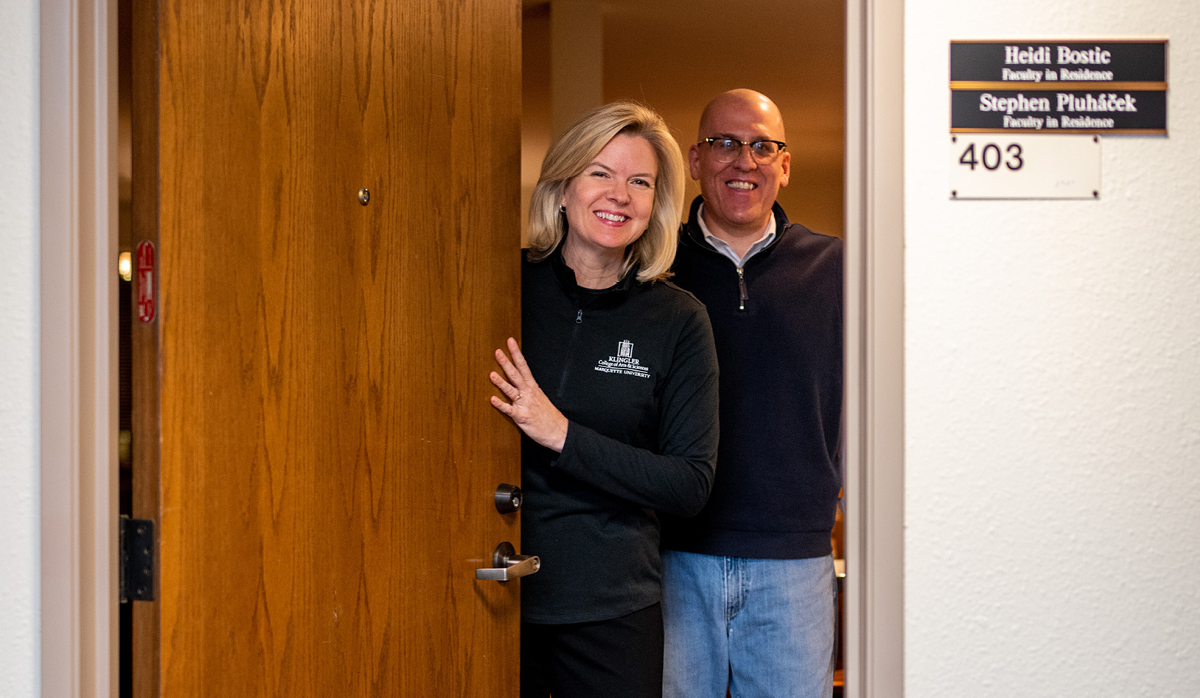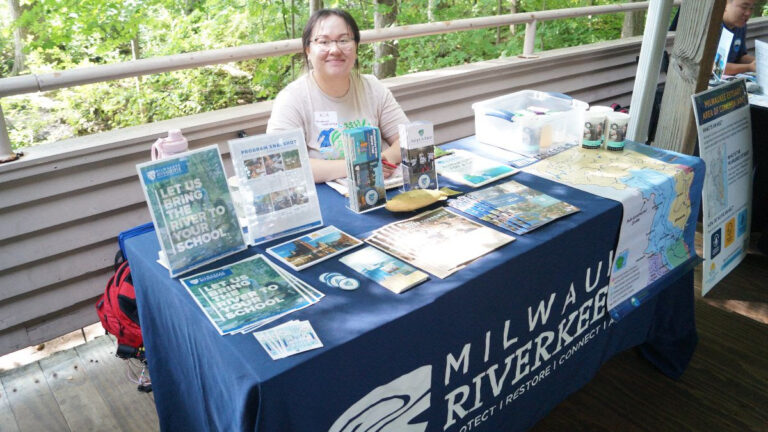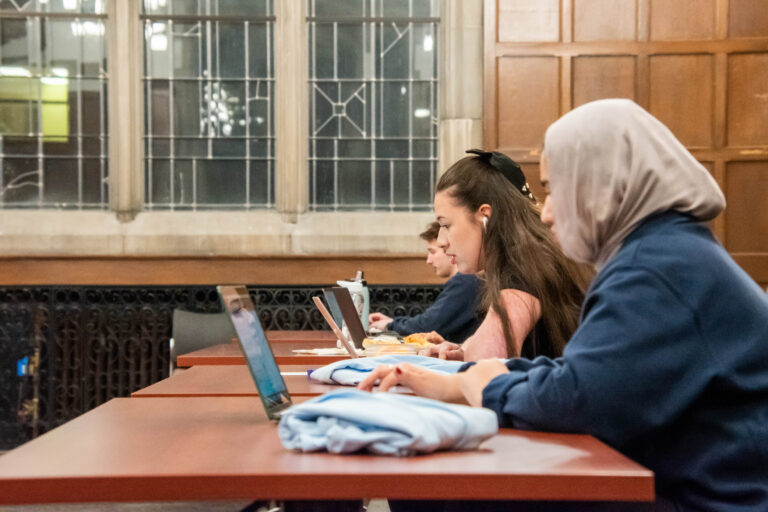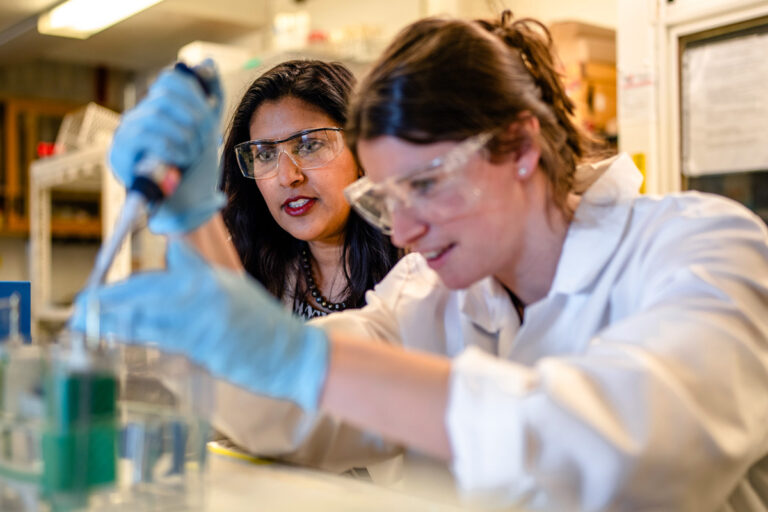When Dr. Heidi Bostic and Dr. Stephen Pluháček heard a knock on their apartment door one evening in October, they couldn’t help but wonder: Could this be it?
The couple had left their large Milwaukee East Side house to live in a Marquette-owned apartment building, replacing neighbors they knew with students they were getting to know. They’d taken the plunge to pilot an idea: faculty living on campus to support students in their day-to-day lives and learning experiences — with the added bonus of shorter commutes and more personal connections.
Right away, the commutes were undoubtedly better. Bostic and Pluháček enjoyed their apartment and sensed things were going well. But the personal connections? They didn’t yet know whether students saw them as a helpful resource or an awkward intrusion. Wouldn’t it be great, they thought, if someone would just drop by?
Bostic opened the door to see two young women, one a familiar face and smiling, the other less familiar and hanging back a bit. They lived three doors down the hall, the women explained, and their refrigerator had broken. They were in the middle of making enchiladas when they realized their cheese had spoiled. Might Bostic and Pluháček have any to spare?
“And we did,” Bostic says. “Lots of it.”
Katie Darragh and Maryn Schaefbauer couldn’t have known how much their question meant to the couple. Darragh had met them before and knew they would welcome visitors, but had to convince her roommate it would be OK. Clearly, it was. “Stephen was so excited that we had come by to ask for cheese,” Darragh recalls with a laugh.
Inside, Pluháček, who does most of the cooking, began pulling out an impressive array of cheeses. There was friendly chit-chat — some of it in Spanish between Bostic and Schaefbauer — before the neighbors headed home with a bag of mozzarella, a generous bowl of homemade butternut squash soup, and a nutmeg clove that Pluháček promised would be awesome grated over the soup before serving.
Affirming a vision
That simple favor and others that followed — the couple were delighted to lend a can opener a few evenings later — helped validate their decision. “It sounds silly,” Bostic says, “but it feels like a victory that students are comfortable enough to come and knock on our door.” Bostic and Pluháček’s move to campus was motivated by personal convictions, past experiences and some practical “why not?” considerations. By the time they arrived at Marquette in the spring of 2020 — she to become dean of the Klingler College of Arts and Sciences (and later the College of Education), he as an affiliated faculty member in the Department of Theology — their academic careers had sent them around the globe. They loved the time they spent in urban areas where they could walk more than drive, encounter people by chance and get to know their community.
“I guess part of it is we’re trying to live out our good Jesuit values of discernment,” Bostic says. “We tend to ask how could this be better, how could we be doing more?” Thoughts about simplicity and convenience played a role. With no children or pets, the move would be easy. And, as with so many others, the pandemic had made them more eager to engage with people. “We thought, how can we deepen our relationships, especially with our colleagues and students?”
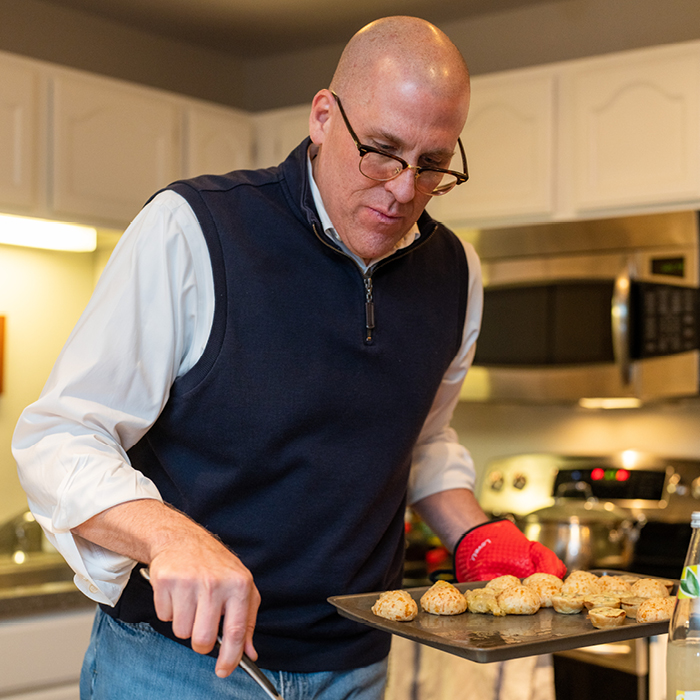
The couple approached Mary Janz, executive director of housing and residence life, without knowing she had been mulling the faculty-in-residence idea for years. “It was a beautiful meeting of the minds,” says Janz.
A spacious, furnished apartment that had once been home to then-President Scott Pilarz, S.J., happened to be available. It was on Wells Street near the Alumni Memorial Union. Three months later, Bostic and Pluháček moved in. “We immediately felt as much or more at home here than we did in our house,” says Pluháček. “Probably because it was the right decision.”
A natural fit
Discernment isn’t the only core Jesuit value behind the fledgling initiative.
The Jesuit practices of establishing ministries in urban centers, educating the whole person and extending the learning environment outside the classroom are all in keeping with the concept. There’s already an honored tradition of Jesuit priests living on campus and faculty engaging with Marquette’s living learning communities. Equally compatible is Marquette’s commitment, as an anchor institution of the Near West Side Partners, to developing the neighborhoods around campus. That initiative’s PARC program — Promoting Assets, Reducing Crime — is working to attract more faculty and staff to neighborhoods like Bostic and Pluháček’s.
Janz sees faculty as a fitting complement to the existing support systems in residence halls that include full-time professional staff, student resident assistants and hall ministers. “I see them working together in really beautiful ways, looking at residents’ academic lives, their faith and spiritual side, and as college students learning to live independently.”
Janz, Bostic and Pluháček are actively exploring ways to expand beyond the pilot, learning as they go. Bostic calls it a “deeply collaborative process” involving colleagues from the offices of Residence Life and Student Affairs along with resident assistants, Campus Ministry, the Jesuit community, faculty, facilities staff and more. As teams work deliberately on cross-departmental planning and partnerships, they see endless possibilities. Could resident faculty offer classes, study groups or even office hours in residence halls? How can Student Affairs be involved?
Bostic and Pluháček are living in a university-owned apartment building for upperclass students, but there’s agreement to focus next on first-year students and sophomores who are more likely to benefit from the support. More formalized academic programming is also on the priority list.
Well-established benefits
Beyond borrowed cheese and kitchen utensils, the benefits of faculty-in-residence programs and like-minded efforts such as faculty-mentored research or faculty-led educational travel are actually measurable. Students report having stronger learning experiences when they have close relationships with faculty and staff, says Dr. Jody Jessup-Anger, professor and chair of educational policy and leadership, whose research focuses on how the collegiate environment affects student learning and development. “The outcomes really are around learning more, developing critical thinking skills and students feeling like they are more connected to campus.”
That makes sense to Darragh, Bostic and Pluháček’s cheese-borrowing neighbor. She’s enthusiastic about having faculty in residence. “The most meaningful experiences I’ve had at Marquette are those moments where I’m connecting with faculty or staff in conversations that aren’t surrounded by curriculum,” she says. “It’s more surrounded by a mentoring relationship.” Darragh, a junior majoring in corporate communication with a German minor, can imagine how helpful a residence program would be to new students who are still becoming comfortable with their professors.
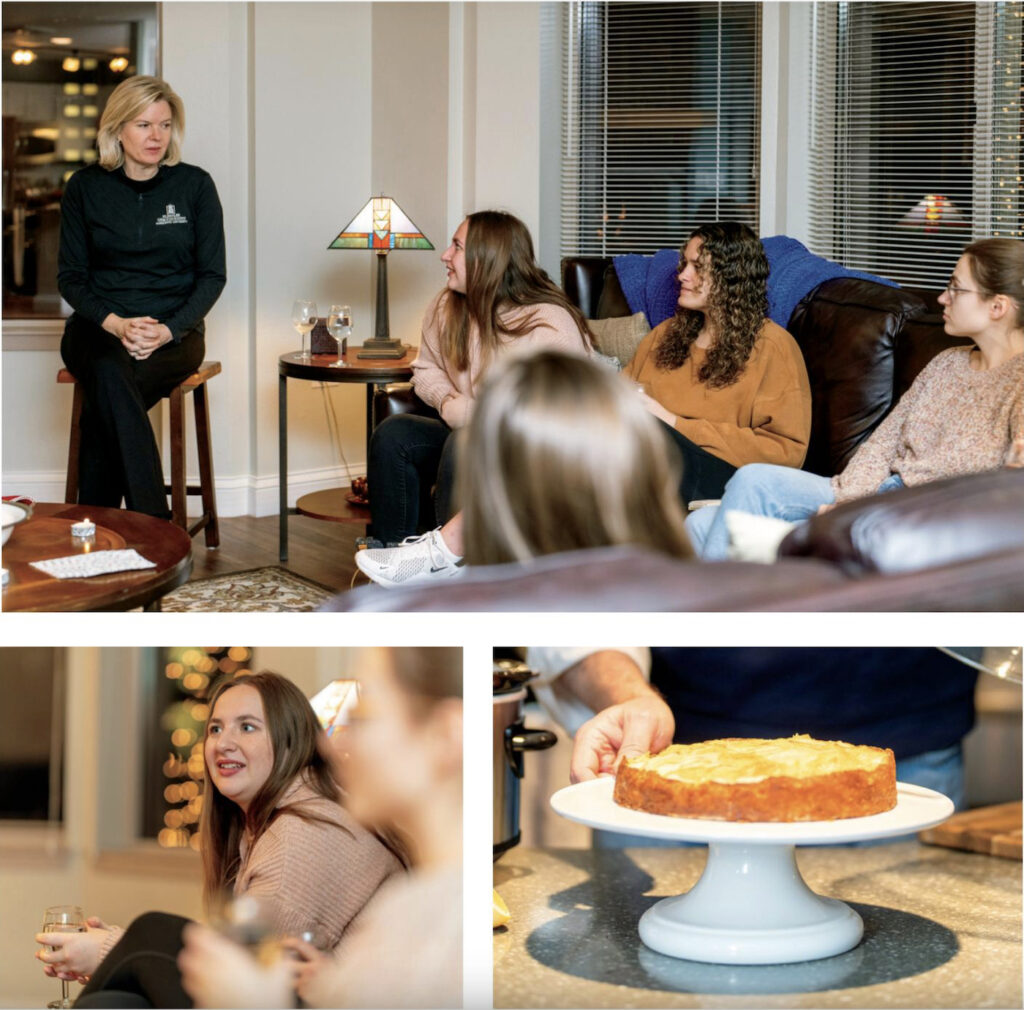
Appetizers and advice
On a chilly night in December, Bostic and Pluháček put a leaf in their dining room table and slid a tray of appetizers into the oven. They had invited six students over for dinner, a mix of first- and third-year students. Pluháček had prepared creamy carrot soup and poussin (small chickens) with herb sauce and wild rice. Bostic had baked an Italian tart. There was no agenda, but both were listening for insights on what students need most from a faculty-in-residence program.
The students were greeted warmly, took seats by the fireplace and sipped sparkling water as everyone met one another. Darragh and Schaefbauer were there. So was a first-year student who met her hosts when they volunteered on move-in day at her first-year residence hall, then later bumped into them at Church of the Gesu. Several brought friends.
Bostic and Pluháček listened closely as their guests shared observations. They said they loved the idea of faculty in residence. They had practical observations about how to make it work (examples: take the initiative with outreach, organize study sessions — and remember that food is always a good idea). Perhaps building on the rapport the couple had already started establishing with them, “they freely discussed difficult topics and shared their opinions and views perhaps more openly than would be customary in a classroom setting,” says Bostic. “So, I am wondering if faculty in residence can help to foster challenging conversations.”
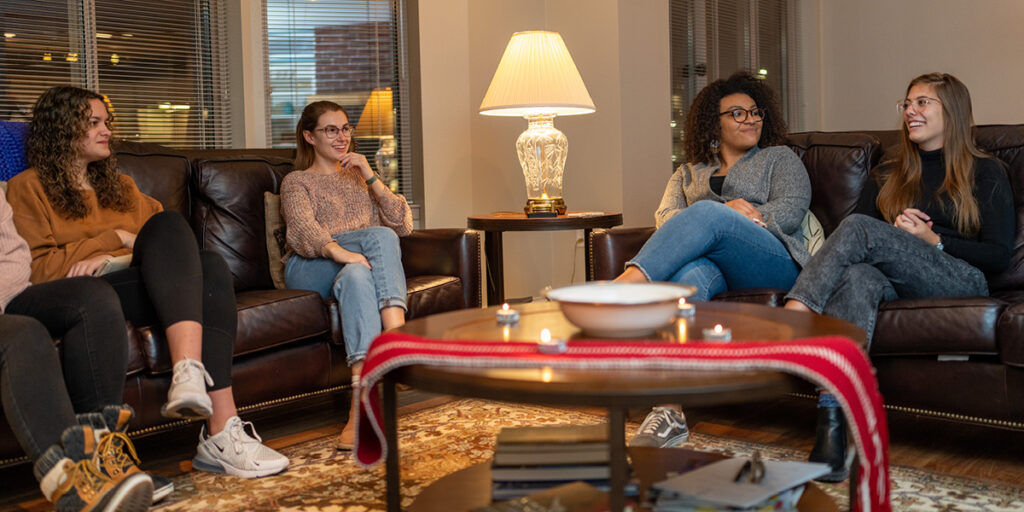
“The most meaningful experiences I’ve had at Marquette are those moments where I’m connecting with faculty or staff in conversations that aren’t surrounded by curriculum.”
Junior Katie Darragh, second from left above
The dinner, those early knocks on the door, impromptu conversations and shared shuttle bus rides downtown for Golden Eagles basketball games have all convinced Bostic and Pluháček that there is both the need and the desire for the connections that a faculty-in-residence program can offer. “Just those brief hallway interactions where you ask, ‘How are you doing?’ can mean a lot,” says Bostic. “It’s another way to live out our Catholic, Jesuit mission by demonstrating cura personalis, that is, engaging with students as whole human persons. It’s really an honor and a privilege to live among Marquette students.”

